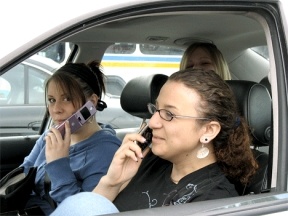CLINTON — Lawmakers in Olympia passed two laws aimed at rude drivers this week.
One stops motorists from talking on their hand-held cellphones while driving. The other is designed to stop folks who cut in line at ferry docks.
Both laws have teeth — each violation carries a $101 fine.
Islanders took the new laws in stride. And though some vowed to change their driving habits, an unscientific survey at a recent sailing from the Clinton ferry dock showed that may take a little time. Roughly 20 percent of drivers were chatting away as they drove on board.
The new ban on cellphones makes violations a “secondary offense,” meaning it must be tied to another violation such as unfastened seat belts or a broken tail light, before a citation can be issued.
Those who utilize a “hands-free” device such as a headset can still drive and chat.
Drivers at the Clinton Ferry Terminal said they would adjust to the new law, which takes effect by July of this year.
“I have a stick shift so I usually put it on speaker phone,” said Sahara Colman.
“I use my cell phone from time to time, but I try to pull over if I can,” said Amber O’Brien of Freeland. She also has a direct-connect feature that allows her to talk without the phone held to her ear; that wouldn’t be illegal under the new law.
Sue Gordon thinks the legislation is a good idea.
“If I feel the need to talk, I definitely will start to pull over to the side of the road,” she said. “My husband uses a hands-free device when he’s doing business; that seems like a pretty good solution.”
Teens may have the toughest time dealing with the new law. South Whidbey High School senior Lakota Holder noted he and all his friends use cell phones while driving.
“I don’t think it’s more dangerous than driving with the CD player on,” he said. “But I’m likely to be more conscious about it. I can imagine being on the phone and simply rolling through a stop sign; that’s when they’ll get you.”
One of the strongest supporters of the new law was motorcyclist Glenn Carter of Bothell.
“Drivers using cell phones are a clear danger to everyone on the road, especially to guys on bikes,” Carter said. “I’ve been trying to get this passed for years. Trust me, people do not pay attention when they’ve got a phone jammed to their ear. It’s a righteous law and about time.”
Washington State Patrol Trooper Dave Martin said it’s too soon to tell how quickly drivers will catch on to the new law.
“Personally, I find that any driving distraction — putting on make-up, watching a movie, even singing to the oldies — can cause an accident,” Martin said.
Motorists who cut in ferry lines will also be subject to a $101 fine under a bill passed last week. It was sponsored by Sen. Mary Margaret Haugen, D-Camano Island, and was passed earlier by the state Senate.
“I started on this many years ago based on testimony from a lot of frustrated island drivers,” Haugen said.
“At first I didn’t have the support of the State Patrol, but since they’ve been stationed at the ferries they’ve seen it for themselves and come to agree with me that something needed to be done,” she said.
The bill makes it illegal to cut in ferry lines and also makes it an infraction for a motorist to block a residential driveway while waiting in line for the ferry.
As they waited for the noon ferry in Clinton on Thursday, drivers were happy about the law but expressed concerns about clueless visitors.
“If folks are strangers to the ferry system, they may not understand,” said Inge Nussbaum of Freeland.
“They need better signs in Mukilteo; it has to be clear or they’ll get a ticket,” she said.
Helen Kamps isn’t afraid to give impolite drivers a piece of her mind.
“We waited for the ferry two hours one time and a guy cut in front of us,” she said. “I was really upset so I sought him out. He sort of brushed me off but his wife was embarrassed about it.”
Kristin Roberts said the $101 fine would stop her from cheating in the ferry line.
“I’d think twice before cutting into the line if I knew it would cost that much money,” she said.
Whidbey Island Representatives were split on the cell phone ban.
Rep. Barbara Bailey (R-Oak Harbor) voted against the new law, while Rep. Strow (R-Freeland) voted for it. The House passed the bill 59-38 on April 11.
Both Bailey and Strow voted to approve the law targeting ferry line cheaters. It passed the House on an 87-11 vote on April 10.
Jeff VanDerford can be reached at 221-5300 or jvanderford@southwhidbeyrecord.com.



